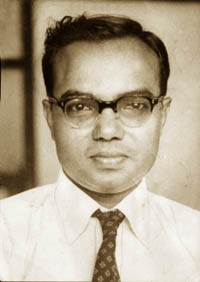I bid adieu to Rupavahini

|

Guiding light of Rupavahini:
M.J. Perera |
THEATRE: First things first. In my article about Black July
and Rupavahini a couple of weeks back I have made a very regrettable
mistake.
It was revealed to me when I received an e - mail from Mrs. G.
Rathinam from Sydney, Australia. Says she in part of her e-mail - "I
happened to read the column where you wrote about Black July....I
retired from my job in Rupavahini and left Sri Lanka in Sept.1984.
Therefore I was shocked and distressed when you had mentioned my name
indicating that I may have given approval for the assignment to send a
Sinhala crew to Jaffna.
The tragic event of the Rupavahini vehicle being burnt and the crew
being killed did not take place when I was in service. As I followed the
news I learnt that this horrible event took place around September -
October, 1987 after a Peace Accord was made...."
I had confused the event with an earlier outing to Jaffna, somewhere
in 1984, to record some Tamil cultural programs - including a teledrama
- because most of the Tamil artists had left Colombo after the incidents
of Black July.
I am extremely sorry about this mix-up and I tender my innermost
apologies to Mrs. Rathinam for any pain of mind. In fact we worked
together in the General Programs Division of Rupavahini for nearly two
years until Mrs. Rathinam decided to migrate to Australia in Sept. 1984.
Her family had suffered a lot during the ugly events of Black July.
Mrs. Rathinam was Director, Tamil Programs at that time and was a fine
person and a tireless worker. My apologies once again, dear lady.
Stage productions
If I may get back to my narrative about Rupavahini after the attack
at Pidurutalagala, we carried on as if nothing had happened, giving very
little prominence to the event. We managed to obtain some excellent
programs through our Procurement Committee which included renowned
programs such as 'The Living Planet' and 'World at War'.
My friend Titus Thotawatte received another bonanza when we got down
the tele series 'MALGUDI DAYS" based on the collection of short stories
by R.K. Narayan. In fact the dubbed series became as popular as 'OSHIN'
itself.
I would like to mention some of the programs that I introduced to the
Rupavahini fare at that time. Being a stage man, I always had a soft
corner for stage people. I introduced a once a month programme called
'Eheta Kanata' where we focused attention on the latest stage
productions with a chat with the playwright or the director [who often
happened to be the same person - a curious tradition in our country!]
and excerpts from the new play.
From the Children's Unit [which was under Dr. Salaman Fonseka at that
time] I motivated one of the unit's producers - Srimathi Liyanage, to
launch a programme by the name of 'Piya Satahan' [Foot Prints] to
introduce the past giants of our literary field.
Men of letters and great dedication such as Munidasa Cumaratunga,
Ven. S. Mahinda Thera, Ananda Rajakaruna, Martin Wickramasinghe, P.B.
Alwis Perera, Rapiel Tennakoon, Piyadasa Sirisena etc. were featured in
these programs through the memory of their children, brothers, sisters
and grandchildren etc. Part of the legacy these giants have left behind
were also revealed to the audience of children. The programme came in
for a lot of praise from parents, elders and teachers.
Hema Nalin Karunaratne produced a very popular youth programme called
'Prathibha' for which I composed a theme song. Nalin introduced a lot of
young talent through this program. Some of those young men and women
have turned out to be very useful and active citizens of the country.
A programme I particularly enjoyed was a half hour programme by the
title of 'Sammaani' where I interviewed veteran artists of yesteryear in
a very informal and friendly atmosphere from our Studio Number Two.
They were mostly singers of a forgotten and bygone era. They were
delighted to participate in that program. Almost all of them obliged the
viewer with some of their old favourites.
The very first artist I interviewed under Sammaani was that golden
voiced singer, Kokiladevi Weeratunga who passed away recently, well past
the age of 90! She was past seventy even at that time, but her voice was
flawless.
It cascaded like a well orchestrated waterfall! She sang some of her
favourites such as 'Mavpiya aadie, Sonduru tamage - Kula detuwan sema'
and "Sripathi srihari Vishnu Devinda - Satha hata setha devana...'
Favourite programme
Some of others who were featured in Sammani were M.K. Vincent,
Vasantha Sandanayake, A.M.U. Raj, Romulus de Silva, Nona Subeida and a
host of others whose names I cannot recall now.
It became a favourite programme especially with the older generation
who still held nostalgic memories of their past heroes and heroines. It
is amazing how well most of those singers could still hold forth without
missing a single note. For instance Vasantha Sandanayake's rendering of
her famous song 'Kalyani ganga raajini' was impeccable.
Each time I interviewed one of them I felt sad that they had been
forgotten and neglected by the new world.
I do hope Rupavahini has preserved those cassettes carefully - at
least for posterity. If they had, surely it would have been a fine act
of tribute to play back the programme of Kokiladevi Weeratunga when she
passed away recently.
The mid eighties were critical once again for us because of rumblings
by the JVP. The production of outdoor programs became difficult once
again. Whatever happened in the country the viewers more or less
demanded their share of entertainment - after all they were paying a
licence fee at that time!
M.J. Perera asked me what we could do. I said the only alternative is
to invite well known stageplays and make Studio Productions out of them.
Mr. Perera thought that was a good idea and asked me to go ahead. He
suggested that we start with my own production of Hunuwataye Katawa.
So we recorded Hunuwataye Katawa from Studio Three. The Set Dept
under Heenatigala Premadasa made a very simple background set and we did
a full recording of the play.
Parakrama Niriella was the director of the TV production assisted by
Dayaratne Ratagedera. The songs were pre-recorded for better clarity. So
in the actual acting the actors and actresses and the chorus had to
match their lip movements to the recorded songs.
It was not difficult as the majority of the cast was familiar with
the formula. It must have taken us more than a week to complete the job.
I must say Parakrama did an excellent job of the production. At the end
of it we had six half-hour episodes for the TV screen.
Difficult time
The actual problem was not so much the production, but getting the
artistes in, to the Studios. It was such a 'difficult' time, we almost
had to smuggle the actors into the Studios.
The crew and the others involved at Rupavahini helped and we did not
come across major objections of a 'political' nature. And so what you
have been seeing on Rupavahini several times over is that 1986
production of Hunuwataye Kathawa.
In taking this step we were doing a huge service to the Theatre too.
I realised that only later. We were in fact 'preserving' certain stage
productions at their very height of performance for posterity. As soon
as I realized that, I grabbed as many plays as I possibly could.
Thus we recorded some of the productions of Dr. Sarachchandra - but
not, alas, Maname and Sinhabahu - which they refused to give saying that
it would adversely affect the stage productions. If only they had
allowed those two plays also to be recorded, even today we could have
seen some of the impeccable original cast members of the two plays -
such as Trilicia Gunawardene, Edmund Wijesinghe, Shyamon Jayasinghe and
Malini Ranasinghe.
Some of other plays by Dr. Sarachchandra that we were able to record
were Vessantara, Kada Valalu, Elova Gihin Melova Aawa, Rattaran, and
Vellavahum.
Notable plays
We were able to thus record some of the best fare of the Theatre at
that time, which include Bandula Jayawardene's BERA HANDA, W.B.
Makuloluwa's DEPANO, R.R. Samarakoon's KELENI PALAMA and AHASIN VETUNU
MINISSU, Bandula Vithanage's BECKET, K.B. Herath's MAYA DEVI, Ranjith
Dharmakeerthi's ANGARA GANGA GALA BASIE, Jayalth Manoratne's PUTRA
SAMAGAMA, Felix Premawardhana's KALUWARE JARAMARE, Henry Jayasena's
TAVAT UDESANAK and JANELAYA and a host of other notable plays. I do hope
the recordings are still there and that they will be aired regularly
under a special belt for old plays.
Somewhere in 1987 M.J. Perera decided to retire [or resign - I don't
know] from the Chairmanship of Rupavahini. That was a very sad day that
I vividly remember. There was hardly a dry eye in the foyer from where
he bade us goodbye. I still do not know the exact reason for his sudden
departure.
It could be he had his differences with the D.G. he himself had
chosen. As a last parting gesture he removed the official Identity Card
pinned to his shirt front and kept it on the counter. He had tears in
his eyes. We who were solemn onlookers could hardly control our own
emotions.
I could not last long at Rupavahini without my Guru - M.J. Perera.
The guiding light was no longer there. The man with unerring insight who
solved everbody's problems was not to be seen.
The room he occupied was empty - I could hardly look at it. And so
about six months later, on July 6, 1988, on my 57th birthday, I
refrained from asking for an extension of service and bid adieu to
Rupavahini after a spell of nearly five and a half years.
Thought of the week
September is the 'Sahithya' month - Literary month - every year. The
best works of literature for the year 2006 will be awarded at an
impressive ceremony most likely at the BMICH.
Thus the best novel, the best collection of short stories, the best
collection of poems, best translation, best children's book etc will be
awarded by the State. Most likely the President himself will grace the
occasion.
There is further good news for novelists. It seems that some private
literary organisations are going to offer a prize of Rs.500,000/- for
the best novel - of their choice of course.
This should motivate the State too, to increase the prize monies
awarded for each category. Actually the State awards such as Rs. 30,000
for the best novel etc is woefully inadequate.
There will be many events connected to the Sahithya month. There will
be Exhibitions and Sales, Seminars, Conferences and other literary
events not only in Colombo but in the outstations too.
Actually the trend is that of late each succeeding year has produced
more books and more sales at Book Fairs etc. Adults are seen buying more
books than ever before. The publication of Children's books has also
increased tremendously. But the general complaint is that the new
generation is fast moving away from the habit of reading!
While we have MORE quantity wise, I am not sure whether it is the
same quality wise - especially where children's literature is concerned.
Will there be books that last as long as Gamperaliya or Kaliyugaya or
Yuganthaya or Madol Duwa?
[email protected] |

